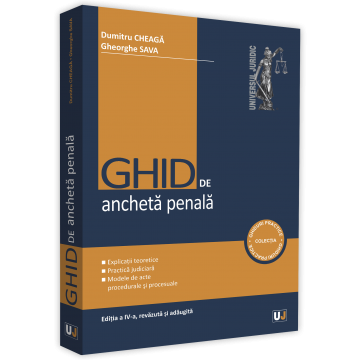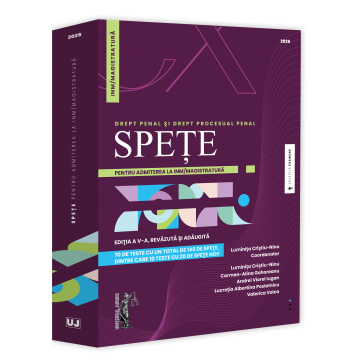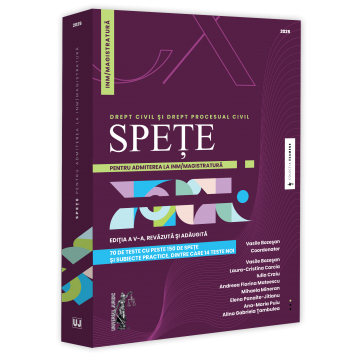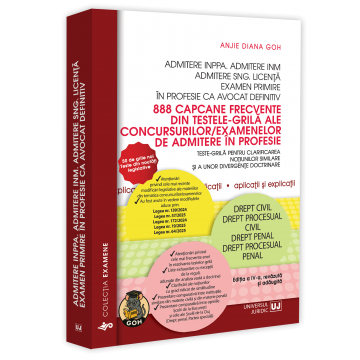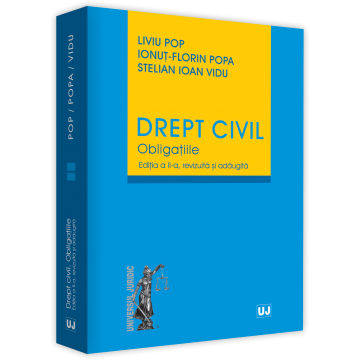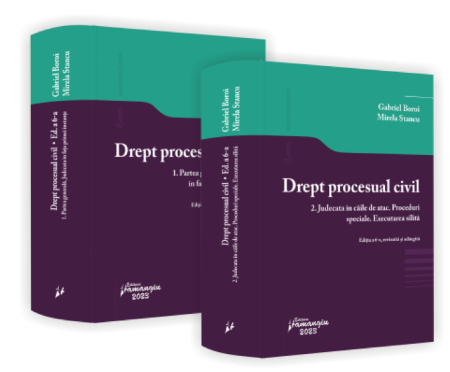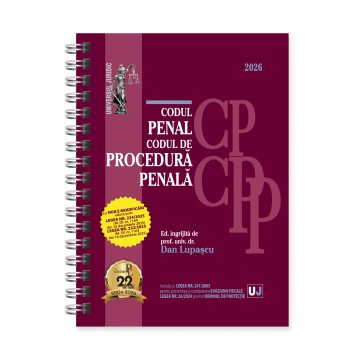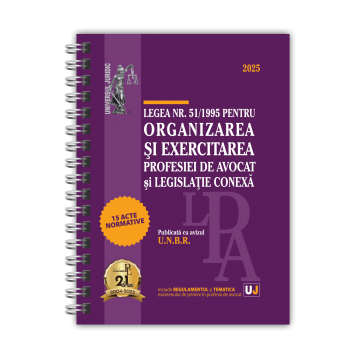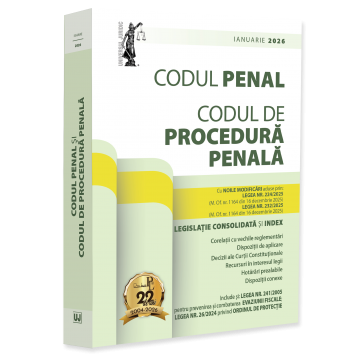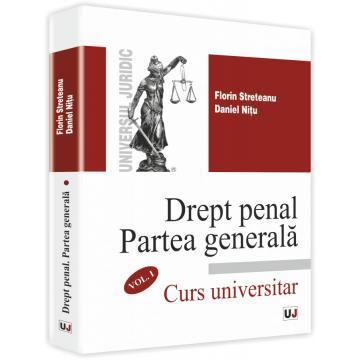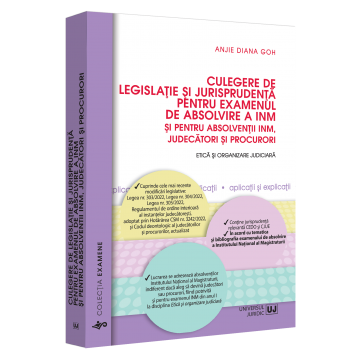Manuscript proposals: [email protected] / 0745 204 115 //// Tracking orders Individuals / Sales: 0745 200 357 / Orders Legal entities: 0721 722 783
Publisher: Editura Universitară
Author: Camelia Spasici
Edition: I
Pages: 416
Publisher year: 2023
ISBN: 978-606-28-1599-8
DOI: https://doi.org/10.5682/9786062815998
Product Code:
9786062815998
Do you need help?
0745 200 357
- Description
- Download (1)
- Authors
- Content
- More details
- Reviews (0)
The work is a monograph dedicated to contractual consent, analyzed under the conditions of the legal regime established by the provisions of the Civil Code from 1864.
The research field has a topic of wide interest, namely the most disputed condition of validity of the civil legal act, consent (as a manifestation of the will made with the intention of producing legal effects), the component of the legal will (complex psychological element, which brings together in its structure, both consent and cause).
Basically, the monograph is structured in two distinct parts, respectively the first part, comprising an exhaustive and critical analysis of the evolution of the "classic" concept of contractual consent, and the second part, reserved for its particularities in legal consumer relations.
The research field has a topic of wide interest, namely the most disputed condition of validity of the civil legal act, consent (as a manifestation of the will made with the intention of producing legal effects), the component of the legal will (complex psychological element, which brings together in its structure, both consent and cause).
Basically, the monograph is structured in two distinct parts, respectively the first part, comprising an exhaustive and critical analysis of the evolution of the "classic" concept of contractual consent, and the second part, reserved for its particularities in legal consumer relations.
-
Contractual, civil and consumer consent
Download
CAMELIA SPASICI is a teacher of the Faculty of Administration and Business of the University of Bucharest, since 2088, and author of several studies in civil matters.
Chapter I. Legal will - the foundation of consent / 17
Section I. Psychological will and legal will / 17
Section II. Legal will. Training, principles, evolution / 19
§ 1. Formation of the legal will / 19
§ 2. Principles of legal will / 20
§ 3. Evolution of the legal will / 23
A. Internal will and declared will. The national conception / 23
B. The theory of the declaration of will and the "objectification" of the legal will / 25
C. Mircea Durma and the notification of the declared will / 26
Section III. The civil legal act, manifestation of complex will. Unilateral acts, multilateral acts and collective acts / 27
Section IV. The particularities of the will in unilateral legal acts / 30
Section V. The limits of the principle of contractual freedom / 32
§ 1. Autonomy of will in the conception of the Civil Code from 1804 / 32
§ 2. Contemporary contract law / 37
A. The theory of "social voluntarism" / 37
B. Postmodernism and the "growth crisis" of the contract / 41
Chapter II. Contractual consent - essential condition of validity / 43
Section I. Validity conditions of the civil legal act / 43
§ 1. Definition of conditions / 44
§ 2. Classification of conditions / 46
§ 3. Enumeration of the conditions of the civil legal act / 49
A. Capacity of the legal act / 49
B. Object of the legal act / 50
C. Cause of the legal act / 51
D. Form of the legal act / 51
Section II. The notion, requirements and evolution of consent / 53
§ 1. Definition of consent / 53
§ 2. Requirements for the validity of the consent / 54
§ 3. Evolution of the concept of consent / 59
Section III. Form of manifestation of consent / 63
§ 1. Consensualism and formalism / 63
§ 2. Evolution of principles / 64
Section IV. Conclusion of the contract - "Convergence" of the offer with acceptance / 71
§ 1. Considerations regarding the contract conclusion mechanism. "Classical scheme" of the agreement of wills / 71
§ 2. Offer to contract / 72
A. Definition / 72
B. Conditions of the offer / 73
C. Binding force of the offer / 74
D. Revocation of the offer before the deadline / 78
E. Offer and promise to contract / 80
§ 3. Acceptance of the offer / 82
§ 4. The time and place of concluding the contract / 83
A. The moment of concluding the contract / 83
B. Place of conclusion of the contract and its importance / 87
§ 5. Contemporary modifications of the "classic scheme" / 88
A. The principles of the "classical scheme" / 88
B. The current "decrease" of the role of the agreement of wills in the conclusion of the contract. Multiplication of contract "models" / 88
C. Theory of adhesion contract / 89
Section V. Correlation "consent-form" in special contracts / 90
§ 1. Peculiarities of the correlation in the sale-purchase contract / 90
A. Applications of consent in the field of sales / 91
B. Form of sale-purchase contract / 98
C. Advertising of real estate sales / 99
§ 2. Consent and form in the donation contract / 101
A. Consent in the donation contract / 101
B. Form conditions. The principle of the solemnity of the donation / 101
C. Varieties of the manifestation of animus donandi / 103
Chapter III. The error – vice of consent / 109
Section I. The "classic" protection of consent. Contemporary elements / 109
§ 1. Defects of consent. Definition and regulation / 109
§ 2. Scope. New methods of protection / 111
Section II. The error. Definition and evolution / 113
§ 1. Definition of error-vice of consent / 113
§ 2. Evolution of error regulation / 115
Section III. Classification of error-vice of consent / 117
§ 1. General considerations / 117
§ 2. Classification of the error according to the consequences / 118
A. Obstacle error / 118
B. Serious error (error-vice of consent) / 121
C. Indifferent error (light error) / 126
§ 3. Classification of the error according to the nature of the falsely represented reality / 127
A. Error of fact / 128
B. Error of law / 128
Section IV. The structure and requirements of the error / 131
§ 1. Structure of the error-vice of consent / 131
§ 2. Requirements of error-vice of consent / 131
§ 3. Peculiarities of the error-vice of consent, in the matter of marriage / 136
Section V. Proof of error / 138
Section VI. Classical and innovative concepts in European doctrine. Notions of "legitimate error" and "vice of weakness" / 140
§ 1. Error in French law / 141
§ 2. Error in German law / 142
§ 3. Error in Italian law / 142
§ 4. Error in Spanish law / 145
§ 5. Error in Anglo-Saxon law / 146
§ 6. Reconsideration of the notion of error. The concept of "vice de faiblesse"V147
Section VII. Error-vice of consent and criminal law / 149
Chapter IV. Dolul - vice of consent and civil tort / 152
Section I. Notion, delimitation and legal nature / 152
§ 1. Notion / 152
§ 2. Delimitation of the dole from other institutions / 153
A. Cheating and fraud / 153
B. Doul and error / 155
C. Mourning and violence / 156
D. Grief and guilt / 156
E. Dolul and the criminal offense / 157
§ 3. Legal nature of the dole / 157
§ 4. The "ambivalence" of the doll / 159
Section II. Dowry in Romanian law / 160
Section III. Classification of the doll / 164
§ 1. Different classifications / 164
§ 2. Mourning through reluctance / 166
Section IV. The structure, requirements and evidence of the dole / 171
§ 1. Structure of the dole / 171
§ 2. Requirements of the dole / 172
A. Dole should be decisive for the conclusion of the legal act / 172
B. The mourning should come from the other side / 174
§ 3. Proof of intent / 175
Section V. Areas specific to the manifestation of the dol / 176
§ 1. Dolul in liberalities / 176
§ 2. Bereavement in family law / 178
Section VI. Dol in comparative law / 180
§ 1. Dowry in French law / 180
§ 2. Dowry in Italian and Spanish law / 181
§ 3. Dowry in Anglo-Saxon law / 183
Chapter V. Violence / 185
Section I. Notion and regulation / 187
§ 1. Definition of violence / 187
§ 2. Evolution of the regulation / 190
Section II. Classification of violence / 192
Section III. The structure of violence / 194
A. The objective element / 194
B. The subjective element / 195
Section IV. Requirements and proof of violence / 196
§ 1. Requirements of violence / 196
A. Fear should be decisive / 196
B. Violence should be just / 200
§ 2. Proof of violence / 202
Section V. Violence, vice of consent in the matter of marriage / 202
Section VI. Violence in comparative law / 204
§ 1. Violence in Italian law / 204
§ 2. Violence in French law / 206
§ 3. Violence in Spanish law / 208
§ 4. Violence in Anglo-Saxon law / 208
Chapter VI. Injury - vice of consent? / 211
Section I. Definition and regulation of the injury / 211
Section II. History of injury regulation / 213
§ 1. The European evolution of regulation / 213
§ 2. Scope of injury in the Civil Code from 1864 / 219
Section III. The structure and conditions of the injury / 222
§ 1. Structure of the lesion / 222
§ 2. Conditions of the injury / 222
Section IV. Sanction of injury / 223
Section V. Comparison between vices of consent / 223
§ 1. Similarities of vices of consent / 224
§ 2. Differences between defects of consent / 224
Chapter VII. "Traditional" and "specific" sanctions for failure to comply with the consent condition / 226
Section I. Preventive sanctions and curative sanctions / 226
Section II. The concept of nullity / 228
§ 1. Definition of nullity / 228
§ 2. Seat of the matter / 230
A. Regulations of the Civil Code from 1864 / 230
B. Regulations of the draft Civil Code (2004) / 230
C. Regulations of the Draft European Contract Code / 233
Section III. The evolution of the nullity concept / 234
§ 1. General aspects / 234
§ 2. The concept of nullity in European regulations / 235
Section IV. Delimitation of nullity by other civil institutions / 238
§ 1. Delimitation of the nullity of the resolution / 238
§ 2. Delimitation of the nullity of termination / 240
§ 3. Delimitation of the nullity of revocation / 241
§ 4. Delimitation of the nullity of expiration / 241
§ 5. Delimitation of the nullity of reduction / 242
§ 6. Delimitation of the nullity of unenforceability / 243
Section V. Nullity functions / 243
§ 1. Potential function / 244
§ 2. Operative function / 244
§ 3. Preventive function / 245
§ 4. Sanctioning function / 245
§ 5. Reparative function / 246
Section VI. Classification of annulments / 246
A. Absolute nullity and relative nullity / 246
B. Theory of non-existent documents / 247
C. Total nullity and partial nullity / 249
D. Express nullity and virtual nullity / 250
E. Judicial nullity and amicable nullity / 250
F. Nullity of substance and nullity of form / 250
Section VII. Causes of nullity in the matter of consent / 251
§ 1. "Specific" causes of absolute nullity / 251
§ 2. "Specific" causes of relative nullity / 253
Section VIII. The effects of the nullity of the civil legal act / 255
§ 1. Notion of effects of nullity / 255
§ 2. Principles of nullity effects / 256
A. The principle of retroactivity of nullity effects / 257
B. The principle of restoring the previous situation (restitutio in integrum) / 258
§ 3. The principle of annulment of the subsequent act as a result of the annulment of the initial act (resoluto iure dantis, resolvitur ius accipientis) / 259
§ 4. Rules of law that remove the principle quod nullum est, nullum producit efectum / 260
A. The principle of conversion of the legal act / 260
B. Rule of error communis facit ius / 262
C. The principle of tortious civil liability / 262
§ 5. imitating the effects of nullity / 263
A. Limitation of effects through partial nullity / 263
B. Confirmation / 264
Section IX. The legal regime of relative nullity - the "traditional" sanction of the vice of consent / 266
§ 1. Legal regime of absolute nullity / 266
A. Absolute nullity can be invoked by anyone who has an interest / 266
B. Absolute nullity is imprescriptible / 269
C. Absolute nullity, in principle, cannot be covered by confirmation / 271
§ 2. Legal regime of relative nullity / 272
A. The relative nullity can be invoked, in principle, only by the interested person / 273
B. The relative nullity is prescriptive / 274
C. Relative nullity can be covered by confirmation / 276
Section X. Regularization - "specific" sanction of civil contracts affected by a defect of consent / 277
Chapter VIII. Civil and criminal liability, subsequent to the voidable civil legal act for defects of consent / 281
Section I. Notion of civil liability. Delimitation / 281
§ 1. Definition of civil liability / 281
§ 2. Delimitation of tortious civil liability from contractual liability / 282
Section II. Tortious civil liability / 285
§ 1. Damage, condition of tortious civil liability / 286
A. Patrimonial and non-patrimonial damages / 286
B. The damage can be caused directly to the human person or the goods that he possesses / 287
C. Foreseeable damages and unforeseeable damages / 287
D. Instant damages and successive damages / 287
§ 2. Illegal act / 289
§ 3. The causal relationship between the illegal act and the damage / 293
A. The system of equivalence of conditions / 294
B. Proximate cause system / 294
C. The appropriate cause system / 294
D. The system of indivisible unity between cause and conditions / 295
§ 4. The fault of the person who caused the damage / 296
§ 5. Peculiarities of tortious liability in Romanian civil law / 301
Section III. The basis of contractual civil liability / 302
Section IV. Reparation of damage / 303
§ 1. The preventive function of tortious civil liability in case of alteration of consent / 305
§ 2. The reparative function of civil liability / 309
Section V. Sanction of defects of consent in criminal matters / 312
Chapter IX. Peculiarities of the formation of the consumer contract / 319
Section I. Characteristics of contracts concluded with consumers / 319
§ 1. The relationship: private law – right of consumption / 319
§ 2. The consumer contract "objective legal institution" / 320
Section II. Consumer information / 324
§ 1. Notion of the pre-contractual obligation to inform / 324
§ 2. Content of the information. Methods of realization / 326
§ 3. Consequences of failure to fulfill the obligation to inform / 330
§ 4. Obligation to advise / 333
Section III. Consumer protection against abusive clauses / 336
§ 1. Preliminary considerations / 336
§ 2. The principle of transparency in the drafting of contractual clauses / 337
§ 3. Abusive clauses / 338
A. Scope / 338
B. Notion of abusive clause / 340
C. Excepted clauses / 342
D. Finding abusive clauses / 349
Chapter X. The consumer's right to "unilateral denunciation": the problem of consent? / 355
Section I. Contracts concluded at a distance / 356
§ 1. Notion and scope / 357
§ 2. Peculiarities of consumer information / 360
§ 3. Conclusion of the contract / 362
§ 4. Execution of the contract / 364
§ 5. Peculiarities of contracts relating to financial services / 365
Section II. Contracts concluded outside commercial premises / 368
§ 1. Scope of regulation / 369
§ 2. Conclusion of the contract / 373
Section III. The consumer's right of unilateral denunciation / 374
§ 1. The concept of unilateral denunciation / 374
§ 2. The right of unilateral denunciation under the conditions of O.G. no. 130/2000 regarding consumer protection when concluding and executing distance contracts / 375
§ 3. The right of unilateral denunciation under the conditions of O.G. no. 85/2004 regarding distance contracts concluded between financial service providers and consumers / 377
§ 4. The right of unilateral denunciation under the conditions of O.G. no. 106/1999 regarding contracts concluded between merchants and consumers (in places not intended for commercial activity) / 379
§ 5. Legal nature of the consumer's right of "unilateral denunciation" / 381
BIBLIOGRAPHY / 386
I. Treatises, courses, monographs / 386
II. Studies, articles, notes, comments / 403
III. Published jurisprudence / 414
Section I. Psychological will and legal will / 17
Section II. Legal will. Training, principles, evolution / 19
§ 1. Formation of the legal will / 19
§ 2. Principles of legal will / 20
§ 3. Evolution of the legal will / 23
A. Internal will and declared will. The national conception / 23
B. The theory of the declaration of will and the "objectification" of the legal will / 25
C. Mircea Durma and the notification of the declared will / 26
Section III. The civil legal act, manifestation of complex will. Unilateral acts, multilateral acts and collective acts / 27
Section IV. The particularities of the will in unilateral legal acts / 30
Section V. The limits of the principle of contractual freedom / 32
§ 1. Autonomy of will in the conception of the Civil Code from 1804 / 32
§ 2. Contemporary contract law / 37
A. The theory of "social voluntarism" / 37
B. Postmodernism and the "growth crisis" of the contract / 41
Chapter II. Contractual consent - essential condition of validity / 43
Section I. Validity conditions of the civil legal act / 43
§ 1. Definition of conditions / 44
§ 2. Classification of conditions / 46
§ 3. Enumeration of the conditions of the civil legal act / 49
A. Capacity of the legal act / 49
B. Object of the legal act / 50
C. Cause of the legal act / 51
D. Form of the legal act / 51
Section II. The notion, requirements and evolution of consent / 53
§ 1. Definition of consent / 53
§ 2. Requirements for the validity of the consent / 54
§ 3. Evolution of the concept of consent / 59
Section III. Form of manifestation of consent / 63
§ 1. Consensualism and formalism / 63
§ 2. Evolution of principles / 64
Section IV. Conclusion of the contract - "Convergence" of the offer with acceptance / 71
§ 1. Considerations regarding the contract conclusion mechanism. "Classical scheme" of the agreement of wills / 71
§ 2. Offer to contract / 72
A. Definition / 72
B. Conditions of the offer / 73
C. Binding force of the offer / 74
D. Revocation of the offer before the deadline / 78
E. Offer and promise to contract / 80
§ 3. Acceptance of the offer / 82
§ 4. The time and place of concluding the contract / 83
A. The moment of concluding the contract / 83
B. Place of conclusion of the contract and its importance / 87
§ 5. Contemporary modifications of the "classic scheme" / 88
A. The principles of the "classical scheme" / 88
B. The current "decrease" of the role of the agreement of wills in the conclusion of the contract. Multiplication of contract "models" / 88
C. Theory of adhesion contract / 89
Section V. Correlation "consent-form" in special contracts / 90
§ 1. Peculiarities of the correlation in the sale-purchase contract / 90
A. Applications of consent in the field of sales / 91
B. Form of sale-purchase contract / 98
C. Advertising of real estate sales / 99
§ 2. Consent and form in the donation contract / 101
A. Consent in the donation contract / 101
B. Form conditions. The principle of the solemnity of the donation / 101
C. Varieties of the manifestation of animus donandi / 103
Chapter III. The error – vice of consent / 109
Section I. The "classic" protection of consent. Contemporary elements / 109
§ 1. Defects of consent. Definition and regulation / 109
§ 2. Scope. New methods of protection / 111
Section II. The error. Definition and evolution / 113
§ 1. Definition of error-vice of consent / 113
§ 2. Evolution of error regulation / 115
Section III. Classification of error-vice of consent / 117
§ 1. General considerations / 117
§ 2. Classification of the error according to the consequences / 118
A. Obstacle error / 118
B. Serious error (error-vice of consent) / 121
C. Indifferent error (light error) / 126
§ 3. Classification of the error according to the nature of the falsely represented reality / 127
A. Error of fact / 128
B. Error of law / 128
Section IV. The structure and requirements of the error / 131
§ 1. Structure of the error-vice of consent / 131
§ 2. Requirements of error-vice of consent / 131
§ 3. Peculiarities of the error-vice of consent, in the matter of marriage / 136
Section V. Proof of error / 138
Section VI. Classical and innovative concepts in European doctrine. Notions of "legitimate error" and "vice of weakness" / 140
§ 1. Error in French law / 141
§ 2. Error in German law / 142
§ 3. Error in Italian law / 142
§ 4. Error in Spanish law / 145
§ 5. Error in Anglo-Saxon law / 146
§ 6. Reconsideration of the notion of error. The concept of "vice de faiblesse"V147
Section VII. Error-vice of consent and criminal law / 149
Chapter IV. Dolul - vice of consent and civil tort / 152
Section I. Notion, delimitation and legal nature / 152
§ 1. Notion / 152
§ 2. Delimitation of the dole from other institutions / 153
A. Cheating and fraud / 153
B. Doul and error / 155
C. Mourning and violence / 156
D. Grief and guilt / 156
E. Dolul and the criminal offense / 157
§ 3. Legal nature of the dole / 157
§ 4. The "ambivalence" of the doll / 159
Section II. Dowry in Romanian law / 160
Section III. Classification of the doll / 164
§ 1. Different classifications / 164
§ 2. Mourning through reluctance / 166
Section IV. The structure, requirements and evidence of the dole / 171
§ 1. Structure of the dole / 171
§ 2. Requirements of the dole / 172
A. Dole should be decisive for the conclusion of the legal act / 172
B. The mourning should come from the other side / 174
§ 3. Proof of intent / 175
Section V. Areas specific to the manifestation of the dol / 176
§ 1. Dolul in liberalities / 176
§ 2. Bereavement in family law / 178
Section VI. Dol in comparative law / 180
§ 1. Dowry in French law / 180
§ 2. Dowry in Italian and Spanish law / 181
§ 3. Dowry in Anglo-Saxon law / 183
Chapter V. Violence / 185
Section I. Notion and regulation / 187
§ 1. Definition of violence / 187
§ 2. Evolution of the regulation / 190
Section II. Classification of violence / 192
Section III. The structure of violence / 194
A. The objective element / 194
B. The subjective element / 195
Section IV. Requirements and proof of violence / 196
§ 1. Requirements of violence / 196
A. Fear should be decisive / 196
B. Violence should be just / 200
§ 2. Proof of violence / 202
Section V. Violence, vice of consent in the matter of marriage / 202
Section VI. Violence in comparative law / 204
§ 1. Violence in Italian law / 204
§ 2. Violence in French law / 206
§ 3. Violence in Spanish law / 208
§ 4. Violence in Anglo-Saxon law / 208
Chapter VI. Injury - vice of consent? / 211
Section I. Definition and regulation of the injury / 211
Section II. History of injury regulation / 213
§ 1. The European evolution of regulation / 213
§ 2. Scope of injury in the Civil Code from 1864 / 219
Section III. The structure and conditions of the injury / 222
§ 1. Structure of the lesion / 222
§ 2. Conditions of the injury / 222
Section IV. Sanction of injury / 223
Section V. Comparison between vices of consent / 223
§ 1. Similarities of vices of consent / 224
§ 2. Differences between defects of consent / 224
Chapter VII. "Traditional" and "specific" sanctions for failure to comply with the consent condition / 226
Section I. Preventive sanctions and curative sanctions / 226
Section II. The concept of nullity / 228
§ 1. Definition of nullity / 228
§ 2. Seat of the matter / 230
A. Regulations of the Civil Code from 1864 / 230
B. Regulations of the draft Civil Code (2004) / 230
C. Regulations of the Draft European Contract Code / 233
Section III. The evolution of the nullity concept / 234
§ 1. General aspects / 234
§ 2. The concept of nullity in European regulations / 235
Section IV. Delimitation of nullity by other civil institutions / 238
§ 1. Delimitation of the nullity of the resolution / 238
§ 2. Delimitation of the nullity of termination / 240
§ 3. Delimitation of the nullity of revocation / 241
§ 4. Delimitation of the nullity of expiration / 241
§ 5. Delimitation of the nullity of reduction / 242
§ 6. Delimitation of the nullity of unenforceability / 243
Section V. Nullity functions / 243
§ 1. Potential function / 244
§ 2. Operative function / 244
§ 3. Preventive function / 245
§ 4. Sanctioning function / 245
§ 5. Reparative function / 246
Section VI. Classification of annulments / 246
A. Absolute nullity and relative nullity / 246
B. Theory of non-existent documents / 247
C. Total nullity and partial nullity / 249
D. Express nullity and virtual nullity / 250
E. Judicial nullity and amicable nullity / 250
F. Nullity of substance and nullity of form / 250
Section VII. Causes of nullity in the matter of consent / 251
§ 1. "Specific" causes of absolute nullity / 251
§ 2. "Specific" causes of relative nullity / 253
Section VIII. The effects of the nullity of the civil legal act / 255
§ 1. Notion of effects of nullity / 255
§ 2. Principles of nullity effects / 256
A. The principle of retroactivity of nullity effects / 257
B. The principle of restoring the previous situation (restitutio in integrum) / 258
§ 3. The principle of annulment of the subsequent act as a result of the annulment of the initial act (resoluto iure dantis, resolvitur ius accipientis) / 259
§ 4. Rules of law that remove the principle quod nullum est, nullum producit efectum / 260
A. The principle of conversion of the legal act / 260
B. Rule of error communis facit ius / 262
C. The principle of tortious civil liability / 262
§ 5. imitating the effects of nullity / 263
A. Limitation of effects through partial nullity / 263
B. Confirmation / 264
Section IX. The legal regime of relative nullity - the "traditional" sanction of the vice of consent / 266
§ 1. Legal regime of absolute nullity / 266
A. Absolute nullity can be invoked by anyone who has an interest / 266
B. Absolute nullity is imprescriptible / 269
C. Absolute nullity, in principle, cannot be covered by confirmation / 271
§ 2. Legal regime of relative nullity / 272
A. The relative nullity can be invoked, in principle, only by the interested person / 273
B. The relative nullity is prescriptive / 274
C. Relative nullity can be covered by confirmation / 276
Section X. Regularization - "specific" sanction of civil contracts affected by a defect of consent / 277
Chapter VIII. Civil and criminal liability, subsequent to the voidable civil legal act for defects of consent / 281
Section I. Notion of civil liability. Delimitation / 281
§ 1. Definition of civil liability / 281
§ 2. Delimitation of tortious civil liability from contractual liability / 282
Section II. Tortious civil liability / 285
§ 1. Damage, condition of tortious civil liability / 286
A. Patrimonial and non-patrimonial damages / 286
B. The damage can be caused directly to the human person or the goods that he possesses / 287
C. Foreseeable damages and unforeseeable damages / 287
D. Instant damages and successive damages / 287
§ 2. Illegal act / 289
§ 3. The causal relationship between the illegal act and the damage / 293
A. The system of equivalence of conditions / 294
B. Proximate cause system / 294
C. The appropriate cause system / 294
D. The system of indivisible unity between cause and conditions / 295
§ 4. The fault of the person who caused the damage / 296
§ 5. Peculiarities of tortious liability in Romanian civil law / 301
Section III. The basis of contractual civil liability / 302
Section IV. Reparation of damage / 303
§ 1. The preventive function of tortious civil liability in case of alteration of consent / 305
§ 2. The reparative function of civil liability / 309
Section V. Sanction of defects of consent in criminal matters / 312
Chapter IX. Peculiarities of the formation of the consumer contract / 319
Section I. Characteristics of contracts concluded with consumers / 319
§ 1. The relationship: private law – right of consumption / 319
§ 2. The consumer contract "objective legal institution" / 320
Section II. Consumer information / 324
§ 1. Notion of the pre-contractual obligation to inform / 324
§ 2. Content of the information. Methods of realization / 326
§ 3. Consequences of failure to fulfill the obligation to inform / 330
§ 4. Obligation to advise / 333
Section III. Consumer protection against abusive clauses / 336
§ 1. Preliminary considerations / 336
§ 2. The principle of transparency in the drafting of contractual clauses / 337
§ 3. Abusive clauses / 338
A. Scope / 338
B. Notion of abusive clause / 340
C. Excepted clauses / 342
D. Finding abusive clauses / 349
Chapter X. The consumer's right to "unilateral denunciation": the problem of consent? / 355
Section I. Contracts concluded at a distance / 356
§ 1. Notion and scope / 357
§ 2. Peculiarities of consumer information / 360
§ 3. Conclusion of the contract / 362
§ 4. Execution of the contract / 364
§ 5. Peculiarities of contracts relating to financial services / 365
Section II. Contracts concluded outside commercial premises / 368
§ 1. Scope of regulation / 369
§ 2. Conclusion of the contract / 373
Section III. The consumer's right of unilateral denunciation / 374
§ 1. The concept of unilateral denunciation / 374
§ 2. The right of unilateral denunciation under the conditions of O.G. no. 130/2000 regarding consumer protection when concluding and executing distance contracts / 375
§ 3. The right of unilateral denunciation under the conditions of O.G. no. 85/2004 regarding distance contracts concluded between financial service providers and consumers / 377
§ 4. The right of unilateral denunciation under the conditions of O.G. no. 106/1999 regarding contracts concluded between merchants and consumers (in places not intended for commercial activity) / 379
§ 5. Legal nature of the consumer's right of "unilateral denunciation" / 381
BIBLIOGRAPHY / 386
I. Treatises, courses, monographs / 386
II. Studies, articles, notes, comments / 403
III. Published jurisprudence / 414
The work is a monograph dedicated to contractual consent, analyzed under the conditions of the legal regime established by the provisions of the Civil Code from 1864.
The research field has a topic of wide interest, namely the most disputed condition of validity of the civil legal act, consent (as a manifestation of the will made with the intention of producing legal effects), the component of the legal will (complex psychological element, which brings together in its structure, both consent and cause).
Basically, the monograph is structured in two distinct parts, respectively the first part, comprising an exhaustive and critical analysis of the evolution of the "classic" concept of contractual consent, and the second part, reserved for its particularities in legal consumer relations.
The research field has a topic of wide interest, namely the most disputed condition of validity of the civil legal act, consent (as a manifestation of the will made with the intention of producing legal effects), the component of the legal will (complex psychological element, which brings together in its structure, both consent and cause).
Basically, the monograph is structured in two distinct parts, respectively the first part, comprising an exhaustive and critical analysis of the evolution of the "classic" concept of contractual consent, and the second part, reserved for its particularities in legal consumer relations.
If you want to express your opinion about this product you can add a review.
write a review

6359.png)
![Contractual, civil and consumer consent - Camelia Spasici [1] Contractual, civil and consumer consent - Camelia Spasici [1]](https://gomagcdn.ro/domains/editurauniversitara.ro/files/product/large/consimtamantul-contractual-civil-si-consumerist-295679.jpg)
